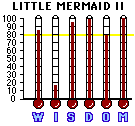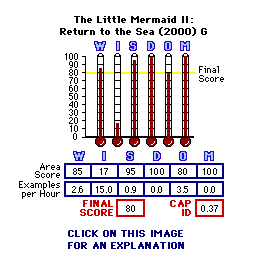Click on CAPCon Alert
image for explanation
A service to parents and grandparents
MAR20095
THE LITTLE MERMAID II
Return to the Sea (2000), (G)
CAP Score: 80
CAP Influence Density: 0.37

Click on CAPCon Alert image for explanation |
A service to parents and grandparents MAR20095 THE LITTLE MERMAID II Return to the Sea (2000), (G) CAP Score: 80 CAP Influence Density: 0.37 |
 |
with your SPECIAL OFFER  From the runaway best-seller. The foul language eliminator Removes profanity from movies and TV shows Switch to LifeLine for Christian long distance service The Family Friendly  Internet Service A Christ Centered Community Web Site Comments?  Christian Media News  A Singles Christian Network  Your One Stop  For Everything Christian Free Email Ministry  Subscribe Today!! PLEASE VOTE! for this site! |
 Christian Banner eXchange For FREE text-only versions of our media analysis reports as they are calculated, open this email then click "send." If your browser does not handle this URL format properly, send us a request to add you.
SUMMARY / COMMENTARY: *THE LITTLE MERMAID II: Return to the Sea* (G) -- a middle-of-the-road PG. There was as much adolescent rebellion and arrogance against parental authority in this Disney flick for the magnitude or total envelope of them to be numerically equivalent to the rebellion and arrogance in R-rated movies of 1995/6. But the rest of the programming was numerically equivalent to G and PG movies of the same period, yielding an overall package score of 80 -- a middle-of-the-road PG. If there is a message to this Disney flick, it is to the preteen and early teen to go for what s/he wants with parental rules and authority being insignificant and parents themselves being in the way when not serving their only purpose in life, i.e., providing for food, shelter, clothing, money... This is a common expectation of kids that age -- God told us about it in Prov. 22:15 -- but to promote and indeed glorify it especially in the name of entertainment is harmful to the child him/herself by quite probably emboldening his/her resistance to correction and discipline: by emboldening the "I just don't care what you do [to me]" mechanism of passive aggressive defiance. Indeed, such influence makes teaching our kids real world reality hard [Heb. 13:17]. Common sentiments expressed by the central adolescent character of this film include "I wish I could tell my mom how I feel, but she'd never understand. I can talk to crabs but not to her." [Luke 18:20] Assessment of the influence of animated features for the potential of them to foster copycat behavior in humans is most difficult except when the portrayed behaviors can be duplicated by a human -- behaviors such as attitude (especially attitude), jumping off a cliff, fighting, pulling a trigger, or choice of words. Behavior which cannot be duplicated by a human child even by the most extreme stretch of the imagination such as rays from a trident miniaturizing a shark is relatively innocuous and is for the most part ignored by the CAP analysis model unless such portrayal is for evil or sinister purposes. But when the fantasy barrier is threatened by influencing the cognitive and perceptive domains with selective manipulations of the immensely powerful influence of language and the sometimes equally powerful influence of music, sound effects and special imagery, influence on thought and thus choice of behavior patterns (coping skills) of at least some of the observers is inevitable, especially if the emotions of the observer happen to resonate with the emotions portrayed onscreen. This is a nutshell rationale behind our analysis of this and other animated features. The movie opens with Ariel singing to her infant Melody in preparation to sail to present Melody to her grandfather Tritan, king of the merpeople of Atlantica, the city beneath the waves. All of Atlantica sing in celebration of Melody. King Tritan gives Melody a gift of a pendant which, when opened, projects an orb image of Atlantica as a reminder of her heritage. During the celebration activities, the sea witch Morganna, sister of Ursula from the first *Little Mermaid*, abducts Melody and threatens to feed Melody to her familiar Undertow [Lev. 19:31], a giant shark, if King Tritan does not surrender his trident to her. Once thwarted by some heroic maneuvers by both Eric (now Melody's father) and Ariel, Morganna threatens to get Tritan's trident any way she can no matter how long it takes, even through Melody. To protect Melody from Morganna, Eric and Ariel decide that Melody should not know her heritage and should not enter the sea. Broken-hearted but understanding, King Tritan drops Melody's pendant into the ocean in painful submission. To help ensure protection of Melody, Eric and Ariel erect a sea wall around their castle home and lay strict rules that Melody is to never go beyond the sea wall. Twelve years later we see Melody dive swimming in the ocean -- beyond the sea wall -- with "truant officer" Sebastian reminding Melody of the rule against swimming beyond the sea wall. But Melody bleats in defiance of the rules "Oh, Sebastian. I can help it! I just love the sea!." [James 3:16] Amongst the "message" programming, Morganna practices a little witchcraft [Deut. 18:10] to try to restore Undertow to his normal size. But upon failure of Morganna to restore him, Undertow mumbles "Ursula could have done it." And amidst an explosion of attitude, Morganna retaliates by blaming her mother, of course: "Stop criticizing me!. That's all my mother ever did was criticize me ... It was always 'Ursula this' and 'Ursula that' or 'Morganna, why can't you be more like your sister Ursula." And through this self-pity party, Morganna, as in much of the show, shows much more of herself than should be seen in polite circles, just like Ursula did. And that fairly well paints the picture for the rest of the show. Common script in the show included "My [mother] just doesn't understand" when the adolescent can't get her way, the witch saying "Well, I'm sure she didn't mean to be so cruel and deceitful" to Melody about her mother, and a scared "toddler" son of Flounder who swims away in fear screaming "DADDY!" with Flounder replying 'What now?" with disgust on his voice. A chief subplot reveals well the possible dangers of this Disney flick to the target adolescent audience and their perception of rightful parental authority and position of parent in the family: [As Melody approaches Ursula with King Tritan's trident] Ursula to Melody: "Oh, THERE you are, darling. I was so worried about you. And look! You've brought back my trident." with melodic flips in her voice. [As Ariel approaches seconds later while Melody continues to approach Ursula] Ariel to Melody: "Melody! Don't! Don't listen to her..." with a pause as they both realize they are now mermaids. Ursula to Melody: "Sweetheart, hand me my trident now!" Melody to Ariel (to mom): "All this time. And you never told me?" Ursula to Melody about Ariel: "Kept the most important secret in her whole life from her own daughter?" Ariel to Melody: "Please! Give it to me, Melody." Ursula to Melody: "No!. Hand it to me! It's for your own good." (Ursula had promised to make Melody's change to a mermaid permanent with the trident.) Ariel to Melody: "She's lying." Ursula to Melody: "I'm the one who's given you what you always wanted. SheeEEEee's [Ariel] the one who lied to you all these years!" Ariel to Melody: "I was trying to protect you!" Melody to Ariel (mom): "By fencing me in? You knew how much I loved the sea. Why did you keep the truth from me?" Ariel to Melody: "Melody! Listen to me. If there is one thing in my life I could do over ..." as Melody turns her back on her mother in favor of the witch. Melody to Ariel (mom) while now within an arm's length of Ursula: "Too late, mom." After handing the trident to Ursula, the rest of the subplot is spent on how sorry Melody was sorry for such rebellion [Is. 30:1], with a large helping of "not my fault" spices thrown in ... just to maintain face, of course. A classic example of the syndrome "Go ahead and do the wrong thing if that is what is important to you as long as you are sorry for it afterwards." And all this is set amidst bright and shiny choreography, pleasant characters, and intricate writing, delicately painting the child rebellion as righteous, justified, honorable and entirely acceptable. And in at least one case, animated explosive adolescent arrogance against a parent was "necessary" to bring about trust. [Prov. 6:20] As always, it is best to refer to the Findings/Scoring section -- the heart of the CAP analysis model -- for the most complete assessment possible of this movie. FINDINGS / SCORING: 
NOTE: Multiple occurrences of each item described below may be likely, definitely when plural. Wanton Violence/Crime (W): Impudence/Hate (I)(1): Sex/Homosexuality (S): Drugs/Alcohol (D): Offense to God (O)(2): Murder/Suicide (M)(3):  |